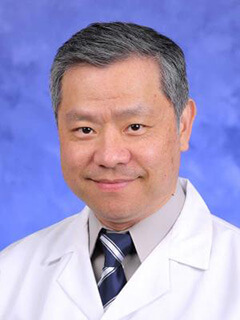August 17, 2021:
Patrick C. Ma, MD, MSc, a professor at Penn State College of Medicine and a medical oncologist specializing in thoracic oncology at Penn State Cancer Institute, has been appointed to represent Penn State Cancer Institute on the Big Ten Cancer Research Consortium Steering Committee.
The Steering Committee is composed of one researcher from each Big Ten CRC member institution and meets regularly to review activities of the consortium and decide matters of policy. The Steering Committee determines the criteria for approving concepts for development with the Big Ten CRC.
Dr. Ma serves as the associate director for translational research and disease team leader of the multidisciplinary thoracic oncology team at Penn State Cancer Institute. Dr. Ma is also co-leader of the next generation therapies program. His research interests span many areas of thoracic cancers, including small cell and non-small cell lung carcinoma, and mesothelioma, as well as oncogenic mutations and signaling in EGFR, ALK, and c-MET/hepatocyte growth factor, among other protein-tyrosine kinases. Dr. Ma’s research team was among the first to identify early-onset adaptive reprogrammed drug persister cells against EGFR targeted therapy. His research laboratory has special emphasis on studying the mechanisms of adaptive drug persisters and acquired drug resistance, as well as single cell analysis in biomarker research.
“I would like to thank Dr. Raymond Hohl, director of Penn State Cancer Institute, for recruiting me to the Institute and allowing me to serve in this role within the Big Ten Cancer Research Consortium,” Dr. Ma said. “I look forward to working closely with my consortium colleagues toward achieving our mission and goals. With a strong spirit of true collaboration, sharing resources, and sharing credit, we will contribute to our long-term success.”
Born and raised in Hong Kong, Dr. Ma moved to Toronto with his parents after completing his bachelor’s degree. He then pursued a graduate degree in biochemistry and molecular biology and also graduated with a medical degree from the University of Toronto. His time in Toronto coincided with the university’s transformative era of cloning the first human T-cell receptor gene and the Human Genome Project, which deeply influenced his decision to pursue oncology as a career. Dr. Ma then went on to complete his residency both in family medicine at Toronto General Hospital and internal medicine at St. Elizabeth’s Medical Center in Boston, and then a fellowship in hematology/oncology at Tufts Medical Center. He also completed a thoracic oncology research fellowship at Dana-Farber Cancer Institute in Boston.
He has worked in a variety of research institutions, including University of Chicago, Case Western Reserve University, Cleveland Clinic, West Virginia University, and now Penn State University. He said each experience has helped broaden his appreciation and understanding of the unique challenges that patients face across a wide range of socioeconomic and cultural backgrounds.
Penn State Cancer Institute is based on the campus of Penn State Health Milton S. Hershey Medical Center in Hershey, Pennsylvania but its senior leadership team and members span Penn State campuses with nearly 40% of its researchers located in State College, Pennsylvania. The Cancer Institute has three research programs focused on the themes of Population Health and Cancer Control, Mechanisms of Carcinogenesis, and Next Generation Therapies. Additionally, pediatric cancer research led by faculty at Penn State Health Children’s Hospital and Penn State College of Medicine is a highly visible part of Penn State Cancer Institute.
“The environment here is very collegial and collaborative,” Dr. Ma said. “It provides a safe, beautiful, and sweet place to live and work.”
About the Big Ten Cancer Research Consortium: The Big Ten Cancer Research Consortium was created in 2013 to transform the conduct of cancer research through collaborative, hypothesis-driven, highly translational oncology trials that leverage the scientific and clinical expertise of Big Ten universities. The goal of the Big Ten Cancer Research Consortium is to create a unique team-research culture to drive science rapidly from ideas to new approaches to cancer treatment. Within this innovative environment, today’s research leaders collaborate with and mentor the research leaders of tomorrow with the unified goal of improving the lives of all patients with cancer.
About the Big Ten Conference: The Big Ten Conference is an association of world-class universities whose member institutions share a common mission of research, graduate, professional and undergraduate teaching and public service. Founded in 1896, the Big Ten has sustained a comprehensive set of shared practices and policies that enforce the priority of academics in the lives of students competing in intercollegiate athletics and emphasize the values of integrity, fairness and competitiveness. The broad-based programs of the 14 Big Ten institutions will provide over $200 million in direct financial support to more than 9,800 students for more than 11,000 participation opportunities on 350 teams in 42 different sports. The Big Ten sponsors 28 official conference sports, 14 for men and 14 for women, including the addition of men’s ice hockey and men’s and women’s lacrosse since 2013. For more information, visit www.bigten.org.

















Subscribe to the Big Ten CRC Newsletter X
X Facebook
Facebook YouTube
YouTube